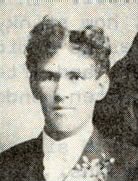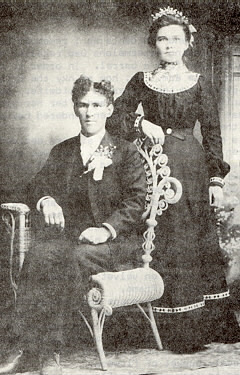
David B. Duerksen

Born: January 12, 1878
Place: Gnadenthal, South Russia
Died: September 3, 1960
Place: Marion County, Kansas

MOTHER:
Aganetha Balzer
FATHER:
Johann Duerksen
SIBLINGS:
Maria B. Duerksen
Johann J. Duerksen
Heinrich J. Duerksen
Helena B. Duerksen
Peter J. Duerksen
Katherina B. Duerksen
Jacob J. Duerksen (1/16/1867-1/25/1867)
Cornelius Duerksen
Aganetha Duerksen
Gerhard J. Duerksen
Eva B. Duerksen
Anna B. Duerksen
Susanna B. Duerksen

SPOUSE:
Maria Friesen (11/18/1882 - 10/15/1968)
Married: June 25, 1903
Place: Marion County, Kansas

CHILDREN:
Arnold J. Duerksen (4/10/1904 - 1/29/1975)
Olga Duerksen (10/17/1905 - 2/1/1966)
Rosa Duerksen (9/14/1907 - Unknown)
Margaret Duerksen (12/19/1909 - Unknown)
Elmer Bruno Duerksen (11/7/1911 - Unknown)
Rubena Duerksen (1/19/1913 - Unknown)

A TRIBUTE TO DAVID and MARY (FRIESEN) DUERKSEN
Written by Daughter Rosa (Duerksen) Voth
Just a few notations and incidents as I remember Dad telling us children. Once while picking watermelons Dad recalled how he had to fetch a pickled watermelon from a barrel. In order to reach the melon he had to emerse his whole arm. Oh, how stinky the brine was! Our grandmother often performed the duties as a midwife. Dad had to hitch the horse to the sulky, fetch a melon, and after her pockets were filled with goodies she was on her way (I often wondered how she ever found those pockets among all the folds).
On rainy days his married brothers and sisters decided to go to town leaving the children at Grandma Duerksens. Dad was supposed to entertain them. When the “reski Tweback” (toasted Zwieback) were all eaten Grandma would bake “Rollkoki” (crullers).
Dad recollected some scenes from his early childhood. Grain was stored upstairs and when he became cranky he wished to be carried up in the attic, but no one would. Then there was the dirt floor which he covered with sand. On Sunday the sand was smoothed a no one was to leave any tracks before company arrived. Dad always found time to work on some project. He did a lot “Fille” which was done of sticks and the string was knotted. He made a coverlet for the square parlor table. He also made flowers from woolen yarn sewed on velvet to accent a Bible verse. This was framed in a shadow box type of frame.
After we children came on the scene and grew up to help with the chores Dad had more time to devote to his flower garden. During the winter months he made flowers of paper or organdy. He designed quite a number of bridal bouquets. He provided flowers for many weddings and arranged sprays for funerals. During a dry summer he scrounged around and was able to surprise the bride with a lovely basket of flowers.
Many people came to look at Dad’s flower garden calling it a paradise. The flower garden was near a steep bank. Father built 30 steps to the South Cottonwood Creek. A plank was fastened for a bridge. Eight steps on the other side up the bank and a short walk took you to the picnic area. One spring we counted 17 picnics that were enjoyed in our pasture.
Across the road in our neighbor’s pasture was a huge tree. It took six men to reach around the tree. Dad planted many shade and fruit trees. We had all kinds of fruit and mother baked lots of pies and cooked moss. Mother was a good entertainer and many guests enjoyed her Faspa, especially during the watermelon and muskmelon season. When it rained we had many high waters. When the waters lowered the fish remained in the sandpit and later Dad and Arnold took the “seine” and we had a good fish fry which mother prepared.
Dad joined the men’s chorus of the community and later was elected “Vorsanger” at the Alexanderwohl Church. Dad started the custom of flower arrangements for Sunday morning church services. He served as school board member when the Steinback School was rebuilt.
In later years he copied poems and drew pretty pictures with them, giving them away as gifts. His eyesight diminished and he had to discontinue this pleasure.












